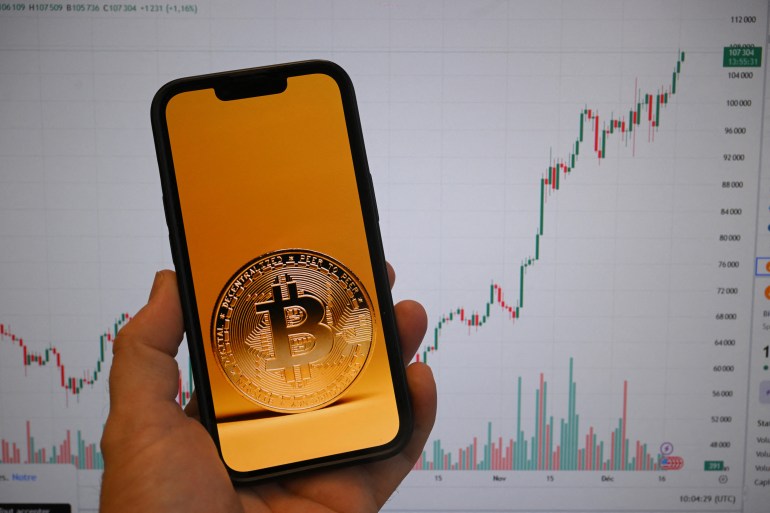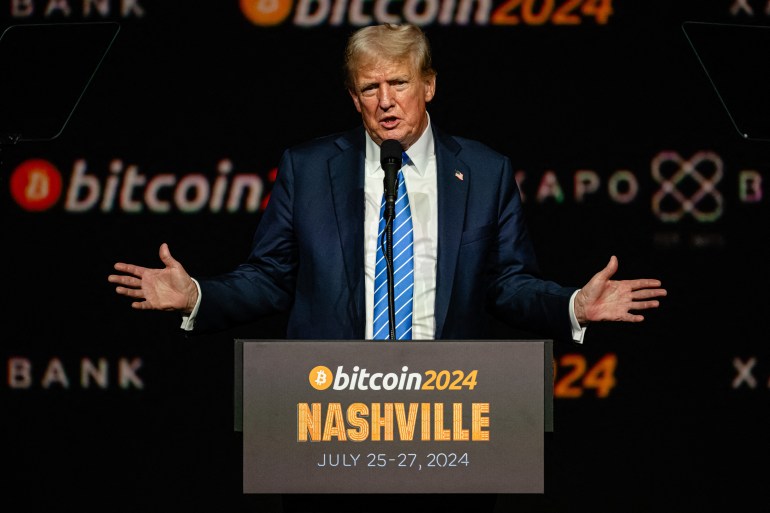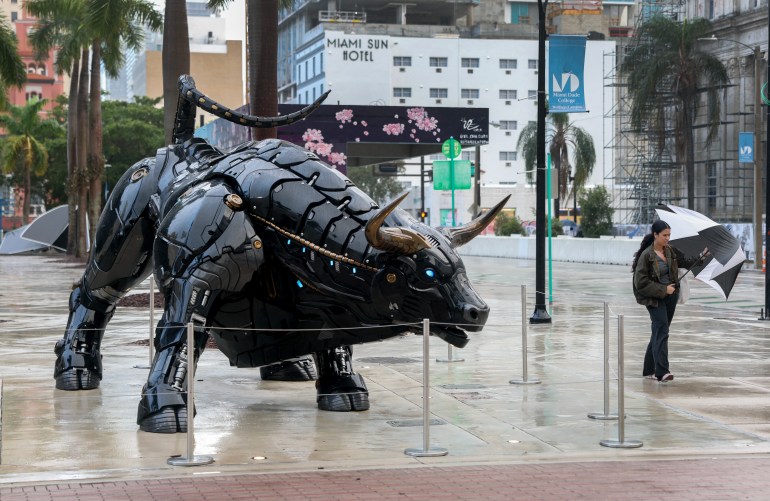Bitcoin has proven to be one of the best-performing assets in modern history.
The value of the cryptocurrency has increased some 1,000 times over the past decade, far outpacing US stocks and real estate.
Buoyed by United States President-elect Donald Trump’s crypto-friendly stance, Bitcoin’s record rally hit a new high of $107,000 on Monday after the Republican reiterated his intention to create a Bitcoin strategic reserve.
Bitcoin, the first decentralised digital currency, was invented by the pseudonymous figure Satoshi Nakamoto in the wake of the 2007-2008 global financial crisis.
Nakamoto introduced the blockchain system – a digital ledger that stores transactions in a network of computers – to enable anyone to make financial transactions without the involvement of banks, financial firms or governments.
Once widely derided as a speculative asset with no intrinsic value, Bitcoin is being taken increasingly seriously by governments, financial institutions and investors alike.
Boaz Sobrado, a London-based fintech analyst, said Bitcoin has transformed from being a niche asset favoured by political dissidents and criminals carrying out Illicit transactions “to something that central banks have to keep in mind and consider”.
“The IMF has put very firm anti-crypto political guidelines into place when negotiating with countries that might require its own assistance. It’s gone from being an academic question to a practical, real one and one that central banks are taking very seriously now,” Sobrado told Al Jazeera.

In January, the US Securities and Exchange Commission (SEC) approved Bitcoin ETFs (exchange-traded funds), allowing investors to have exposure to the asset on the stock exchange for the first time.
In an October report, the US Department of the Treasury referred to Bitcoin as “digital gold”, noting its use as a store of value.
A number of countries have made big bets on the cryptocurrency.
El Salvador has accumulated some $600m worth of Bitcoin reserves and is one of just a handful of countries, along with the Central African Republic, that accepts the asset as legal tender.
Other countries, including the US and the United Kingdom, have acquired large holdings of Bitcoin through the seizure of assets implicated in criminal activity.
The US has seized at least 215,000 Bitcoins, valued at almost $21bn at current prices, since 2020, according to an analysis by crypto firm 21.co.
With Trump returning to the White House, Bitcoin supporters are hopeful that cryptocurrencies will gain unprecedented legitimacy after years of government-led crackdowns on the sector.
Despite once labelling Bitcoin “a scam”, Trump has emerged as arguably the world’s most powerful advocate for the asset.

After pledging to make the US “crypto capital of the planet”, he has picked several high-profile crypto enthusiasts to join his incoming administration, including former PayPal Chief Operating Officer David Sacks as crypto tsar and Paul Atkins as SEC chair.
Trump’s pro-crypto stance has found allies in the US Congress, such as Senator Cynthia Lummis, a Republican from Wyoming, who earlier this year introduced the BITCOIN Act of 2024, which would include Bitcoin among reserve assets such as gold and oil as a long-term store of value.
Under Lummis’s plans, the government would buy roughly 200,000 Bitcoins every year for five years, and then hold the assets for 20 years as a hedge against inflation.
“If we did that with five percent of all the Bitcoin that will ever exist – which is roughly a million Bitcoin – we could cut our debt in half in 20 years,” Lummis said in a television interview with Fox Business.
On Wall Street, derision and mockery have also given way to more positive appraisals.
BlackRock CEO Larry Fink, who once described Bitcoin as an “index of money laundering”, in January said the commodity was “no different than what gold represented for thousands of years” and an “asset class that protects you”.
‘Currency of resistance’
The key attribute of Bitcoin that makes it revolutionary is that it separates money from the state, according to Max Keiser, senior Bitcoin adviser to El Salvador President Nayib Bukele.
“This is the first time in history that this has ever happened – money exists that has no central authority controlling it. This is what makes it unique, very powerful,” Keiser told Al Jazeera.
“There’s now this growing feeling that the 21st century will be the century of Bitcoin.”
Keiser spotted Bitcoin’s potential early on and advised people to buy it when its value was only $1 in 2011. That year, he and his wife, television presenter Stacy Herbert, called Bitcoin “the currency of resistance”, and predicted it would top $100,000.
One of the reasons Bitcoin has gained strength in value is the poor performance of economies such as Argentina, where inflation last year skyrocketed more than 200 percent, according to Gerald Celente, founder and director of the New York-based Trends Research Institute.
“People were seeing their currencies being devalued… People were saying: ‘I’m losing all my money, what am I going to do?’ They can’t afford to buy gold, so they started buying whatever they could in cryptocurrencies like Bitcoin, so that kept it strong,” Celente told Al Jazeera.
Since Trump’s election, Bitcoin’s price has risen by more than 50 percent and with an incoming pro-crypto administration, Celente predicts an even greater rally.
“[The value] could go through the roof, but we don’t see [Bitcoin] going down much at all,” he said.
Crypto supporters argue that Bitcoin’s winning advantage is that its global supply is capped at 21 million.
Unlike central banks that can print money indefinitely, Bitcoin’s supply stays constant no matter the demand, which has helped boost its value against the dollar.
Armando Pantoja, futurist and tech investor, believes that Bitcoin will appreciate in value “forever”, likening the purchase of the asset to buying real estate in Manhattan.
“Bitcoin has value not because of the currency, but because of the technology that governs it, blockchain technology,” Pantoja told Al Jazeera.
“In Bitcoin’s blockchain, there’s a certain supply of Bitcoin that comes out every 10 minutes, and every four years they cut it in half. Over time there is less and less Bitcoin being generated.
“Once it reaches the limit, no more can be created… That’s why it’s going to keep going up, every four years when they cut the supply, it has to respond positively. It has to keep going up to supply the demand.”

Keiser predicts Bitcoin will reach $1m in value in the coming years, with a market cap at least equal to gold’s market cap of $20 trillion.
“That would be $1m a coin. I think that would be a conservative estimate for the price for the next three to four years,” he said.
Bitcoin’s stellar rise, however, has not convinced everyone.
Despite its recent rally, the commodity continues to be extremely volatile.
After hitting $107,000 at the start of the week, the asset had by Friday plunged below $97,000.
Many financial analysts continue to view Bitcoin as a bubble with little to support its stunning rise.
“The more resources Americans misallocate to #Bitcoin and #crypto-related businesses, the fewer resources will be available to devote to making stuff we actually need,” Peter Schiff, chief economist at Euro Pacific Capital, said in a post on X last month.
“The end result will be larger trade deficits, a weaker dollar, higher inflation, and a lower standard of living.”
Even as Trump’s positive stance towards Bitcoin has thrilled crypto enthusiasts, some pro-crypto governments have reined in their support of the sector.
El Salvador announced this week that it would privatize or close its cryptocurrency wallet “Chivo” as part of the terms of a $1.4bn loan deal with the International Monetary Fund (IMF).
Bukele’s government also agreed to make acceptance of Bitcoin by businesses voluntary, within steps to assuage the IMF’s concerns about Bitcoin-related risks.
Central bank digital currencies
Some crypto supporters see governments and central banks taking a leading role in the global march towards digitised money with the development of their own currencies.
Celente of the Trends Research Institute said the US, for example, could create its own digital currency as a way to pay off its federal debt.
“There’s no way the US can pay off their $36 trillion worth of government debt. They may come up with a new cryptocurrency as part of CBDCs (Central Bank Digital Currency),” Celente said.
“You’re seeing more and more of the central banks talking about CBDCs, they’re definitely going to go into that direction,” Celente added.
“They’re going to use this as an excuse to come up with a coin because they cannot pay off the debt that they have now. They’re going to say, ‘This [digital currency] is worth a lot more than the dollar, yuan, the euro,’ and use that to pay off their debt.”
Some observers have warned that the introduction of CBDCs would open a Pandora’s box of problems related to government control and surveillance of people’s finances.
Trump’s pick for commerce secretary, Howard Lutnick, is the CEO of Cantor Fitzgerald, which manages the stockpile of US Treasuries that back Tether, the largest stablecoin by market cap.
Stablecoins are cryptocurrencies that are pegged to a traditional commodity or currency to maintain a stable price. They have reached record volumes of more than $200bn in total market cap.
Sobrado said there could be an opening for Tether to become the national de facto privatised CBDC for the US, and for smaller economies such as the UAE, Hong Kong, Singapore and Switzerland to issue their own CBDCs.
“The pro-crypto voices and Fed-critical voices have never been louder in the White House,” Sobrado said.
Celente said he had no doubt that the future of money is digital.
“There’s no question at all,” he affirmed.